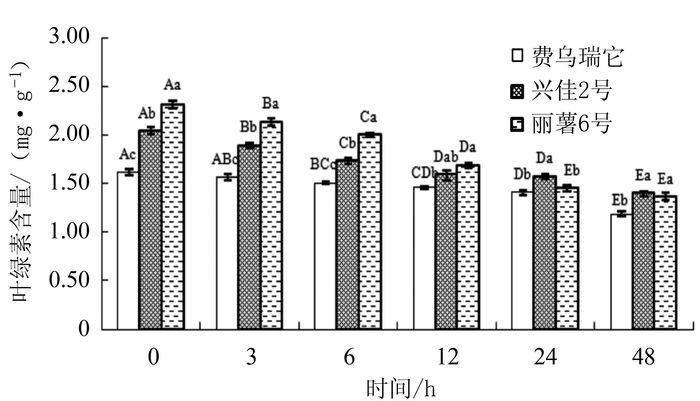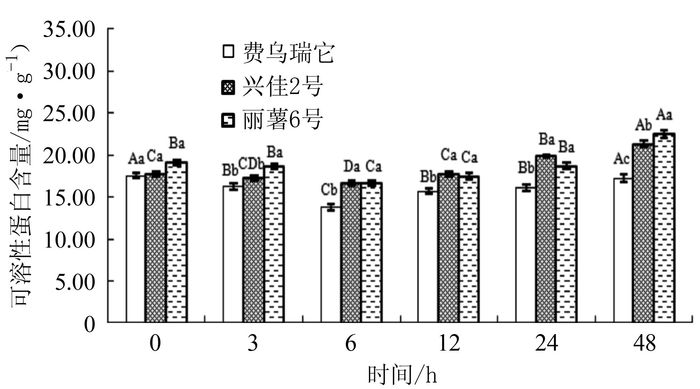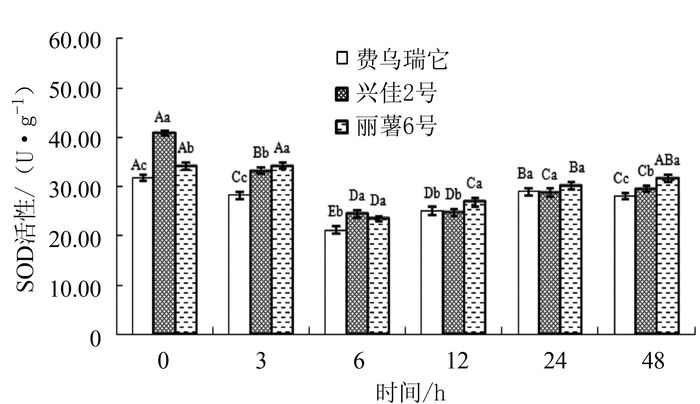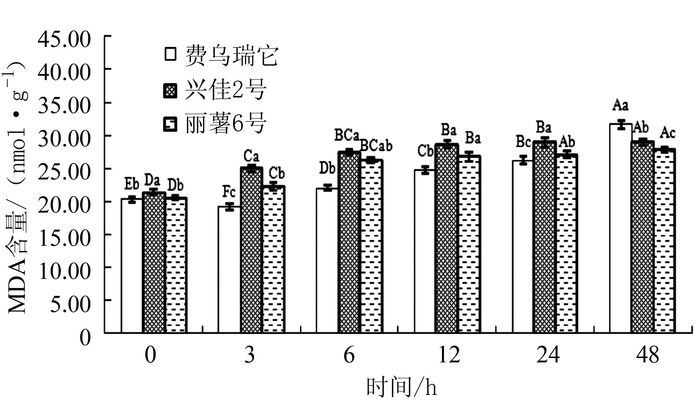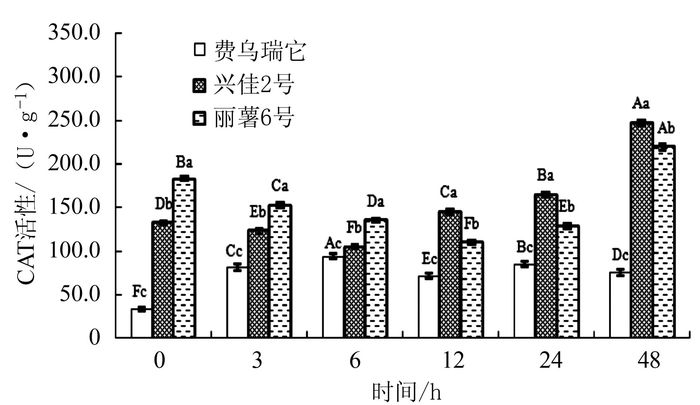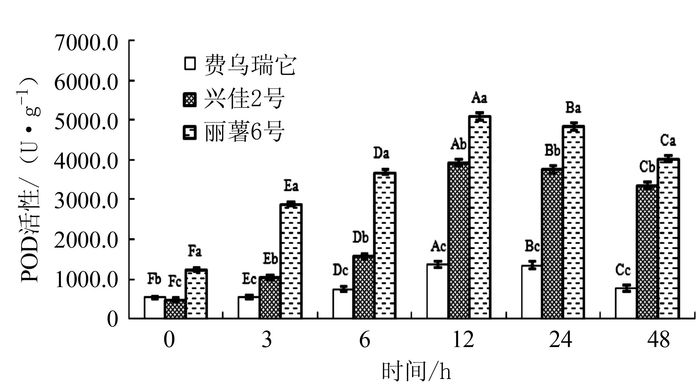Cold Resistance of Potato Varieties for Winter-planting in Guangxi
-
摘要: 探究低温胁迫下不同品种马铃薯苗期叶片生理生化特性,比较广西冬种不同马铃薯品种的耐寒性,为广西冬种马铃薯品种选育提供参考。以费乌瑞它、兴佳2号、丽薯6号3个马铃薯品种为试验材料,4℃低温下进行0、3、6、12、24、48 h胁迫,测定叶绿素、相对含水量、可溶性蛋白含量、丙二醛(MDA)含量、超氧化物歧化酶(SOD)、过氧化氢酶(CAT)和过氧化物酶(POD)活性。结果表明,随低温胁迫时间的延长,3个不同马铃薯品种的相对含水量、叶绿素含量持续下降,在48 h时,费乌瑞它显著低于丽薯6号、兴佳2号。3个品种的可溶性蛋白含量、SOD、CAT活性呈先下降后上升变化趋势,而POD活性呈先上升后下降的变化趋势,在低温胁迫48 h时,丽薯6号、兴佳2号的可溶性蛋白含量、SOD活性、POD活性均显著高于费乌瑞它。各品种的MDA含量在低温胁迫48 h内呈上升变化趋势,在低温胁迫48 h时,费乌瑞它MDA含量显著高于其他品种。3个马铃薯品种的抗寒性由强到弱排列为丽薯6号>兴佳2号>费乌瑞它,与广西主栽品种费乌瑞它相比,丽薯6号和兴佳2号2个新品种具有较强的抗寒性,可在南方冬作区种植与推广应用。Abstract: Effects of low temperature on the physiology and cold stress resistance of potato plants were studied for breeding and cultivation of winter-planting varieties in Guangxi. The physiological and biochemical characteristics of the leaves on 3 selected cultivars in response to low-temperature stress during seedling stage were monitored. Favorita, Xingjia No. 2, and Lishu No. 6 were selected for the study, and the contents of chlorophyll, moisture, soluble protein, and malondialdehyde (MDA), as well as the activities of superoxidedismutase (SOD), catalase (CAT), and peroxidase (POD) in the 5th leaf on a plant were determined after the plant was grown at 4℃ for 0, 3, 6, 12, 24 or 48 h. The results showed that, the leaf relative water and chlorophyll contents of the 3 varieties declined continuously under the stress; and, at 48 h, those of Favorita became significantly lower than those of Xingjia No. 2 or Lishu No. 6. The soluble protein content and the activities of SOD and CAT in the leaves of the 3 varieties decreased initially but increased afterward. In contrast, POD activity rose at first and followed with a downward trend. Under the stress for 48 h, the soluble protein content and activities of SOD and POD in the leaves of Xingjia No. 2 and Lishu No. 6 were significantly higher than those of Favorita, while MDA increased constantly during this period. MDA in Favorita was significantly higher than the other varieties. The cold resistance of the cultivars ranked in the order of Lishu No. 6, Xingjia No.2, and Favorita. Compared to Favorita, which is the major potato variety cultivated in Guangxi, Lishu No. 6 and Xingjia No. 2 appeared to be more suitable for winter-planting to extended the growing season in the region.
-
Keywords:
- low temperature stress /
- potato /
- physiology and biochemistry /
- Guangxi
-
随着我国马铃薯主粮化发展战略的提出,马铃薯将在今后国家粮食安全战略中起到重要的作用。南方冬作区已成为我国马铃薯产业发展的重点区域,近几年南方冬作区马铃薯种植面积逐年递增[1-2],但南方地区冬季低温、阴湿、寡照等不利因素持续时间较长,严重影响马铃薯的植株生长,导致产量下降、减产甚至绝收,造成严重的经济损失[3]。低温冷害成为制约南方马铃薯产量提高和生产区域拓展的主要因素[4]。因此,筛选耐寒性强的马铃薯品种对广西冬作马铃薯生产具有重要意义。国内关于低温胁迫研究已有许多报道[1-6]:辛翠花等[1]研究发现低温胁迫马铃薯幼苗后叶绿素含量和超氧化物歧化酶(SOD)活性先降后升再降,丙二醛(MAD)含量先升后降再升,过氧化物酶(POD)活性先升后降。周真珍等[2]在研究低温胁迫下马铃薯幼苗的丙二醛、叶绿素和SOD等生理生化指标变化时,结果发现大西洋品种表现出的抗寒性优于东农303。陈珏[3]发现低温胁迫条件下,各马铃薯品种叶片的丙二醛和叶绿素总量都上升。和红云等[5]研究结果表明甜瓜品种的耐寒性与SOD、POD和过氧化氢酶(CAT)活性呈正相关。近年来,广西从区外育种单位引进筛选出大批马铃薯新品种,这些品种以高产、优质、抗病等著称,如兴佳2号、丽薯6号、中薯5号等。然而,这些品种的耐寒性尚未进行鉴定。本试验结合广西冬种马铃薯的生产特性,从生理生化特性角度对马铃薯苗期进行耐寒性鉴定,以期筛选出苗期耐寒性较强的马铃薯品种,并阐明广西马铃薯品种在低温胁迫下的苗期生理发育特征,为广西冬种马铃薯品种的选育提供参考。
1. 材料与方法
1.1 试验材料
供试植物材料共3个,分别为内蒙古兴佳种业有限公司提供的兴佳2号、费乌瑞它(广西冬种主栽品种,耐寒型),云南省丽江市农业科学研究所提供的丽薯6号。
1.2 试验方法
1.2.1 试验设计
试验于2015年12月至2016年4月在广西农业科学院经济作物研究所进行。各品种选取健康脱毒种薯,种薯切块大小一致,种芽粗壮,播种于塑料营养钵中,栽培基质为无土栽培基质:沙子比例大约为1:1,每钵种植3穴,生长期间注意保持栽培基质水分充足,待植株幼苗长到5~7片成熟叶时,选取长势一致的幼苗置于GZP-2505型人工智能气候箱进行4℃低温胁迫2 d(光照设置为5 000 lx,白天12 h,夜间12 h,相对湿度60%~70%),每个品种胁迫2钵,3次重复。分别于胁迫后0、3、6、12、24、48 h取样,取样时分别取每株成熟叶片的小叶2~4片,各个胁迫时间的样品采后混匀并分成2份,一份于采样结束时即进行相对含水量、叶绿素含量及各项生理指标的测定,另一份保存于超低温冰箱-80℃下备用。
1.2.2 测定项目与方法
叶绿素含量测定采用丙酮乙醇混合液法[7];相对含水量采用浸泡法测定[8];可溶性蛋白测定采用考马斯亮蓝G-250染色法[9];MDA、CAT、POD、SOD等酶活性采用MDA、CAT、POD、SOD试剂盒测定(苏州科铭生物技术有限公司)。
1.3 数据分析
采用Excel 2007软件进行数据统计分析与作图,并利用SPSS 17.0软件对数据进行方差分析,试验结果为3次重复的平均值。
2. 结果与分析
2.1 低温胁迫对马铃薯叶片相对含水量的影响
如图 1所示,随着低温胁迫时间延长,3个马铃薯品种苗期叶片的相对含水量均呈现下降变化趋势,在低温胁迫6 h之内,3个品种叶片的相对含水量变化不明显,6 h之后均出现下降趋势,在48 h时降到最低值,与胁迫前期(0 h)相比,3个品种的相对含水量变化显著降低,其中费乌瑞它降低23.6%,兴佳2号降低20.2%,丽薯6号降低了18.3%。在同一低温胁迫时间下,不同马铃薯品种苗期叶片的相对含水量也存在差异,在低温胁迫6 h时,兴佳2号与丽薯6号、费乌瑞它差异显著,而丽薯6号和费乌瑞它两者差异不显著;到胁迫48 h时,兴佳2号与丽薯6号、费乌瑞它三者间差异显著,叶片相对含水量表现为兴佳2号>丽薯6号>费乌瑞它。
2.2 低温胁迫对马铃薯叶片叶绿素含量的影响
如图 2所示,随着低温胁迫时间延长,3个马铃薯品种苗期叶片的叶绿素含量均逐渐降低,变化趋势一致,到48 h时降到最低,3个品种的叶绿素含量显著低于低温胁迫前期(0 h),其中丽薯6号下降幅度最大(40.1%),其次是兴佳2号(31.6%),费乌瑞它降低最小(26.6%)。在同一胁迫时间下,各品种间的叶绿素含量也存在差异,在低温胁迫0 h时,丽薯6号叶绿素含量最高,费乌瑞它最低,两者差异显著;在低温胁迫3 h与6 h时,兴佳2号、丽薯6号和费乌瑞它3者间差异达显著水平;在48 h时,兴佳2号、丽薯6号与费乌瑞它之间差异显著,但兴佳2号与丽薯6号差异不显著,3个品种叶片中叶绿素含量表现为兴佳2号>丽薯6号>费乌瑞它。
2.3 低温胁迫对马铃薯叶片可溶性蛋白含量的影响
如图 3所示,随着低温胁迫时间延长,3个马铃薯品种苗期叶片的可溶性蛋白含量均呈现先下降后上升的变化趋势,低温胁迫6 h时,各个品种的可溶性蛋白含量降到最低点,且均显著低于胁迫前(0 h),之后随着胁迫时间的延长,可溶性蛋白含量又呈现上升趋势,到48 h时,兴佳2号、丽薯6号的可溶性蛋白含量均显著高于胁迫前(0 h)。在同一胁迫时间下,各品种间的可溶性蛋白含量也存在差异,在低温胁迫6、12、24 h时,兴佳2号、丽薯6号可溶性蛋白含量与费乌瑞它差异显著;在48 h时,兴佳2号、丽薯6号、费乌瑞它3者间差异均显著,叶片的可溶性蛋白含量表现为丽薯6号>兴佳2号>费乌瑞它。
2.4 低温胁迫对马铃薯叶片SOD活性的影响
如图 4所示,随着低温胁迫时间延长,3个马铃薯品种苗期叶片的SOD活性均呈先下降后上升的变化趋势,低温胁迫6 h时,各品种的SOD活性降到最低值,且均显著低于胁迫前(0 h),之后随着胁迫时间的延长,SOD活性又呈现上升趋势,但变化有所不同,费乌瑞它在24 h时达到最高值,SOD活性显著低于胁迫前(0 h)水平,而丽薯6号和兴佳2号在48 h时达到最高值,其中丽薯6号SOD活性与胁迫前(0 h)相比差异不显著,兴佳2号明显低于胁迫前(0 h)水平。在同一低温胁迫条件下,3个品种的SOD活性变化也有所差异,胁迫6 h时,兴佳2号和丽薯6号SOD活性与费乌瑞它差异显著;在胁迫后期(48 h),丽薯6号、兴佳2号和费乌瑞它3者间差异显著,叶片的SOD活性表现为丽薯6号>兴佳2号>费乌瑞它。
2.5 低温胁迫对马铃薯叶片MDA含量的影响
如图 5所示,随着低温胁迫时间的延长,3个马铃薯品种苗期叶片的MDA含量变化有所不同,其中兴佳2号和丽薯6号2个品种MDA含量变化呈现上升趋势,到48 h时达最高值,且均显著高于胁迫前(0 h),而费乌瑞它随着低温胁迫时间延长,MDA含量变化呈先下降后上升趋势,在胁迫前期(3 h时)MDA含量略微降低,之后MDA含量缓慢增加,到48 h时MDA含量显著高于胁迫前(0 h时)。在同一胁迫时间下,各品种MDA含量也存在差异,在胁迫24 h内,费乌瑞它MDA含量都表现最低,兴佳2号MDA含量表现最高,但到胁迫48 h时,费乌瑞它MDA含量表现最高,丽薯6号最低;在3、24、48 h时,3者间差异均显著;而12 h时,丽薯6号、兴佳2号与费乌瑞它间差异显著。在胁迫48 h时,叶片的MDA含量表现为费乌瑞它>兴佳2号>丽薯6号。
2.6 低温胁迫对马铃薯叶片CAT活性的影响
如图 6所示,随着低温胁迫时间的延长,不同马铃薯品种的CAT活性变化趋势也有所不同,其中费乌瑞它的CAT活性呈现缓慢上升后下降再上升的变化趋势,各胁迫时间CAT活性变化幅度较小,到6 h时达最高值,且显著高于胁迫前(0 h),而丽薯6号和兴佳2号的CAT活性随着低温胁迫开始先缓慢下降后上升的变化趋势,其中丽薯6号CAT活性在12 h时降到最低值,而兴佳2号在6h时降到最低值,之后2个品种CAT活性都逐渐上升,到48 h时达最高值,3个品种CAT活性均显著高于胁迫前(0 h)水平。在同一胁迫时间下,各品种CAT活性也存在差异,在低温胁迫的各个时期,费乌瑞它CAT活性均表现最低;在0、3、6 h时,丽薯6号CAT活性较高,费乌瑞它最低,3者间差异达显著水平;而在12、24、48 h时,兴佳2号CAT活性较高,费乌瑞它最低,3者间差异达显著水平,在48 h时,叶片的CAT活性表现为兴佳2号>丽薯6号>费乌瑞它。
2.7 低温胁迫对马铃薯叶片POD活性的影响
如图 7所示,随着低温胁迫时间的延长,3个不同马铃薯品种苗期叶片的POD活性都呈先上升后下降的变化趋势,在胁迫12 h时达峰值,在达峰值时各品种的POD活性均显著高于胁迫前(0 h时),之后各品种的POD活性均呈现下降趋势,到48 h时降到最低,但各品种的POD活性仍显著高于胁迫前(0 h)的水平。在同一胁迫时间下,不同马铃薯品种叶片POD活性存在差异,在低温胁迫3~48 h期间,费乌瑞它POD活性最低,兴佳2号次之,丽薯6号最高,三者间差异显著,在胁迫48 h时,叶片的POD活性表现为丽薯6号>兴佳2号>费乌瑞它。
3. 讨论与结论
植物细胞内的水分含量、叶绿素含量对植物耐寒性有一定作用;在逆境条件下,叶绿素成为植物叶片光合能力、抗寒性及植株健康状态重要指标之一[10-11]。本研究结果表明,在低温胁迫48 h内,3个马铃薯品种苗期叶片的相对含水量、叶绿素含量呈持续下降趋势,这可能是低温胁迫条件下植物体合成叶绿素的原料不足、叶绿体色素合成酶活性降低、叶绿体功能紊乱从而造成叶绿素含量降低,这与张燕等[10]和邵怡若等[12]研究结果相似。此外,在低温胁迫48 h内,3个马铃薯品种的相对含水量、叶绿素含量变化差异显著,到胁迫后期,兴佳2号和丽薯6号的相对含水量和叶绿素含量均显著高于费乌瑞它,说明兴佳2号和丽薯6号2个品种的耐受低温能力高于费乌瑞它。
可溶性蛋白是植物体内的重要渗透性物质之一,在植物遭受低温冻害时,可通过渗透调节细胞液内溶质的浓度,使细胞液的结冰点降低,减少原生质因结冰而受伤害致死[13]。在本研究结果中,低温胁迫48 h内,3个马铃薯品种的可溶性蛋白含量表现先下降后升高趋势,表明在低温胁迫初期马铃薯可能尚未适应外界环境的变化,可溶性蛋白含量呈现下降趋势,但在后期可溶性蛋白含量呈上升走势,到48 h时,兴佳2号和丽薯6号2个品种的可溶性蛋白含量显著高于胁迫前0 h时水平,且可溶性蛋白含量表现为丽薯6号>兴佳2号>费乌瑞它,这与朱政等[6]研究结果一致,表明低温条件下诱导产生新的蛋白,兴佳2号和丽薯6号2个品种的抗寒性较强于费乌瑞它。
在受到伤害(衰老或在逆境)的条件下植物的活性氧代谢平衡被打破,创造了利于活性氧积累的环境,诱发生物膜发生脂质过氧化作用,致使细胞膜的渗透性发生改变、损伤DNA以及蛋白质,影响细胞正常功能,导致细胞膜系统严重损伤,丙二醛(MDA)是植物发生膜脂过氧化作用的主要产物之一,是衡量植物受低温伤害程度的重要指标之一[2-3]。本研究结果表明,在低温胁迫期间,3个品种的MDA含量变化有所差异,其中费乌瑞它MDA含量变化呈先下降后上升,而兴佳2号和丽薯6号的MDA含量变化趋势相同,都呈上升趋势,3个品种MDA含量在48 h时都达最高值,且均显著高于胁迫前(0 h)水平,即MDA含量大小为费乌瑞它>兴佳2号>丽薯6号,这说明费乌瑞它在低温胁迫中的脂膜过氧化程度稍大,受低温伤害程度稍严重,抗寒性能力相对较差,这与刘瑞峰等[14]、李倩等[15]和史红梅等[16]研究结果相似。
SOD、POD、CAT是植物体内重要的活性清除剂[6, 17]。武雁军等[18]、董爱玲[19]发现茄子幼苗和甜瓜幼苗叶片中的SOD、POD、CAT活性总体呈现上升水平,说明SOD、POD和CAT活性较强的品种耐寒性更强。本研究结果表明,在低温胁迫初期,3个马铃薯品种的SOD活性呈下降趋势,说明受低温胁迫的影响马铃薯体内自由基和活性氧含增加,胁迫的中后期SOD活性逐渐上升,表明低温条件下能诱导SOD的再合成,以避免自由基的大量积累,从而增强机体的抗寒性,这与段会军等[20]研究结果一致,即SOD活性为丽薯6号>兴佳2号>费乌瑞它;3个品种的CAT酶活性变化有所不同,但在胁迫后期各品种的CAT酶活性均显著高于胁迫前0 h水平,说明低温胁迫后CAT活性上升,提高CAT酶清除过量的H2O2残留的能力,进而提高马铃薯的耐寒性,这与前人研究结果相似[11, 17, 21];在胁迫过程中,费乌瑞它POD活性最低,兴佳2号次之,丽薯6号最高,说明兴佳2号和丽薯6号具有较强耐寒性,这与徐冉等[22]研究结果相同。综上所述,在低温胁迫条件下,丽薯6号和兴佳2号抗氧化酶活性显著高于费乌瑞它,说明前者耐受低温胁迫的能力高于后者。
由此可见,低温对广西冬作马铃薯种植的影响较大,从各项生理生化指标测定结果可知,3个马铃薯品种的抗寒性由强到弱排列为丽薯6号>兴佳2号>费乌瑞它,丽薯6号和兴佳2号2个新品种具有较强的抗寒性。
-
-
[1] 辛翠花, 蔡禄, 肖欢欢, 等.低温胁迫对马铃薯幼苗相关生化指标的影响[J].广东农业科学, 2012, 22(43):19-21. http://www.cnki.com.cn/Article/CJFDTOTAL-GDNY201222010.htm [2] 周真珍, 史端甫, 李力, 等.马铃薯东农303、大西洋在低温胁迫下生理生化及光合特性的比较[J].江西农业学报, 2016, 28(5):24-27. http://www.cnki.com.cn/Article/CJFDTOTAL-JXNY201605005.htm [3] 陈珏. 低温弱光胁迫对马铃薯光合生理特性的影响[D]. 长沙: 湖南农业大学, 2011. http://cdmd.cnki.com.cn/Article/CDMD-10537-1011203573.htm [4] 程李, 程柱, 孙洁.贵州马铃薯低温冻害及减灾措施[J].现代化农业, 2014, (8):67-69. http://www.cnki.com.cn/Article/CJFDTOTAL-XDHY201408035.htm [5] 和红云. 低温胁迫对甜瓜幼苗生长及生理生化的影响[D]. 石河子: 石河子大学, 2008. http://cdmd.cnki.com.cn/Article/CDMD-10759-2008171413.htm [6] 朱政, 蒋家月, 江昌俊, 等.低温胁迫对茶树叶片SOD、可溶性蛋白和可溶性糖含量的影响[J].安徽农业大学学报, 2011, 38(1):24-26. http://www.cnki.com.cn/Article/CJFDTOTAL-ANHU201101006.htm [7] 张宪政.植物叶绿素含量测定——丙酮乙醇混合液法[J].辽宁农业科学, 1986, (3):26-28. http://www.cnki.com.cn/Article/CJFDTOTAL-LNNY198603009.htm [8] 周祖富, 黎兆安.植物生理学实验指导[M].南宁:广西大学出版社, 2005:102-117. [9] 孔祥生, 易现峰.植物生理学实验技术[M].北京:中国农业出版社, 2008:160-162. [10] 张燕, 方力, 姚照兵, 等.PEG对烟草幼苗耐低温胁迫能力的生理效应[J].西北农业学报, 2003, 12(1):63-67. http://www.cnki.com.cn/Article/CJFDTOTAL-XBNX200301016.htm [11] 王娜, 王奎玲, 刘庆华, 等.四种常绿阔叶树种的抗寒性[J].应用生态学报, 2016, 27(10):3114-3122. http://www.cnki.com.cn/Article/CJFDTOTAL-YYSB201610007.htm [12] 邵怡若, 许建新, 薛立, 等.低温胁迫时间对4种幼苗生理生化及光合特性的影响[J].生态学报, 2013, 33(14):4237-4247. http://www.cnki.com.cn/Article/CJFDTOTAL-STXB201314002.htm [13] 许楠, 孙广玉.低温锻炼后桑树幼苗光合作用和抗氧化酶对冷胁迫的响应[J].应用生态学报, 2009, 20(4):761-766. http://www.cnki.com.cn/Article/CJFDTOTAL-YYSB200904004.htm [14] 刘瑞峰, 刘卫东, 舒必超.低温胁迫对假俭草SOD酶、MDA及可溶性糖含量的影响[J].湖南林业科技, 2012, 39(6):8-10. http://www.cnki.com.cn/Article/CJFDTOTAL-HLKJ201206005.htm [15] 李倩, 王月异, 王玉祥.低温胁迫对白三叶叶绿素、可溶性糖和丙二醛等的影响[J].中国农学通报, 2016, 32(19):83-86. DOI: 10.11924/j.issn.1000-6850.casb15110105 [16] 史红梅, 张海燕, 杨彬, 等.低温胁迫对高粱幼苗MDA含量、SOD和POD活性的影响[J].中国农学通报, 2015, 31(18):74-79. DOI: 10.11924/j.issn.1000-6850.casb14120134 [17] 高冠, 邹雨伽, 杨再强, 等.低温寡照胁迫对设施番茄花期叶片衰老特性的影响[J].北方园艺, 2016, (5):49-55. http://www.cnki.com.cn/Article/CJFDTOTAL-BFYY201605014.htm [18] 武雁军, 刘建辉.低温胁迫对厚皮甜瓜幼苗抗寒性生理生化指标的影响[J].西北农林科技大学学报, 2007, 35(3):139-143. http://www.cnki.com.cn/Article/CJFDTOTAL-XBNY200703028.htm [19] 董爱玲. 驯化对低温胁迫下茄子幼苗生理的影响[D]. 兰州: 甘肃农业大学, 2016. [20] 段会军, 李喜焕, 吴立强, 等.低温胁迫下西瓜幼苗生理特性与冷害的关系[J].中国农学通报, 2007, 23(1):84-87. http://www.cnki.com.cn/Article/CJFDTOTAL-ZNTB200701019.htm [21] 逯明辉, 宋慧, 李晓明, 等.冷害过程中黄瓜叶片SOD、CAT和POD活性的变化[J].西北植物学报, 2005, 25(8):1570-1573. http://www.cnki.com.cn/Article/CJFDTOTAL-DNYX200508012.htm [22] 徐冉, 任旭琴.低温对辣椒叶面积及生理指标的影响[J].安徽农业科学, 2007, 35(31):9886-9887. DOI: 10.3969/j.issn.0517-6611.2007.31.043 -
期刊类型引用(9)
1. 谢婉莹,祁银燕,刘小利,顾文毅,魏海斌. 青海九个核桃新品种引种的抗寒性. 北方园艺. 2023(12): 29-36 .  百度学术
百度学术
2. 罗文彬,李华伟,许国春,林志坚,纪荣昌,许泳清,邱思鑫,汤浩. 南方冬作区马铃薯新品种闽薯2号耐寒性鉴定. 中国蔬菜. 2022(09): 63-67 .  百度学术
百度学术
3. 侯茹平,蒋景龙,阳妮,李丽,邓家锐,丁德宽,孙旺,董艳鑫. 低温胁迫下8种柑橘的生理响应与抗寒性评价. 分子植物育种. 2021(06): 2013-2022 .  百度学术
百度学术
4. 舒启琼,罗小波,李飞,罗充. 马铃薯抗寒研究进展. 植物生理学报. 2021(06): 1171-1178 .  百度学术
百度学术
5. 吴炫柯,农柳蓬,刘永裕,黄维,韦剑锋,姚裕群. 马铃薯不同发育期适宜温度气象指标研究. 江苏农业科学. 2020(10): 114-117 .  百度学术
百度学术
6. 张招娟,张静,蔡彬彬. 优质食用型马铃薯新品种华颂3号特性鉴定. 种子. 2020(10): 143-147 .  百度学术
百度学术
7. 李树举,王素华,杨丹,段慧,万国安. 马铃薯新品种‘兴佳2号’在湖南的引种表现及配套栽培技术. 中国马铃薯. 2019(03): 140-145 .  百度学术
百度学术
8. 黄寿辉. 自然越冬过程中4个引进菠萝蜜品种抗寒性比较. 农业研究与应用. 2019(03): 19-23 .  百度学术
百度学术
9. 李华伟,林志坚,许泳清,罗文彬,纪荣昌,刘中华,张鸿,李国良,林赵淼,邱永祥,邱思鑫,汤浩. 外源水杨酸对低温胁迫下马铃薯幼苗生理指标的影响. 分子植物育种. 2018(10): 3321-3326 .  百度学术
百度学术
其他类型引用(4)





 下载:
下载:
